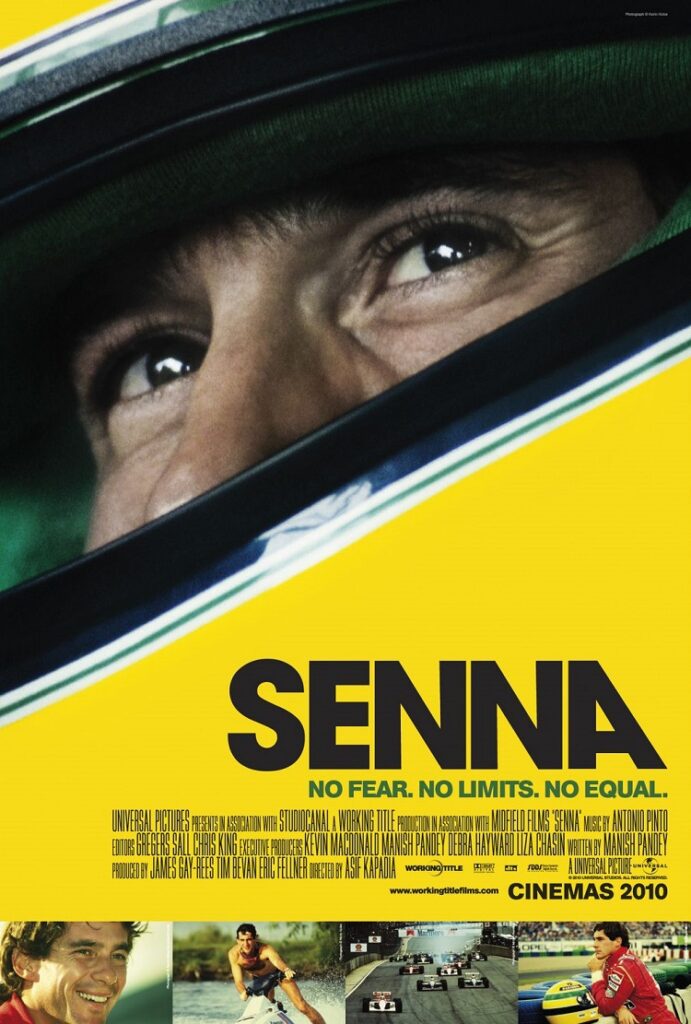
One thing I learned early in life: it’s okay for boys to cry, as long as the tears are shed at sports movies.
So I wasn’t surprised to hear some macho sniffling during a recent screening of Senna, the Sundance-Award-winning documentary about Brazilian Formula One race car driver Ayrton Senna, who died in a tragic crash at the age of 34.
If I lost you at “Formula One” or “race car,” you’re not alone. Had I known more about the topic of the film, I might have avoided it, as I’ve avoided anything relating to motor sports for my entire life (with the exception of Herbie Goes to Monte Carlo).
And that would have been my loss. Because director Asif Kapadia and writer Manish Pandey have constructed a narrative that transcends its topic, using source material that would likely be rendered pedestrian in other hands. The result is a movie that packs the emotional wallop of great fiction, with the spare realism of reportage. And you don’t need to care about cars to be enthralled by it.
Sports documentaries are typically larded with golden-hued talking heads spouting hyperbole about what happened and why you should care. Kapadia foregoes this trope, allowing the story to unfold entirely in artfully rendered archival footage of the quiet, charismatic man who briefly became the biggest name in international auto racing.
Newly recorded interviews with family, friends, and experts are used only in voiceover and inter-cut with announcer commentary from Senna’s races. All of the voices are identified with type graphics, but it’s difficult to discern which, if any, of this material was created for the film.
It’s a creatively risky decision, because it denies the viewer a visual reference for the featured speakers. But it works because it keeps the story firmly rooted in Senna’s time. Kapadia effectively transports us back to the 1980s and early ’90s, where we witness Senna’s rise from wide-eyed, teenaged go-kart racer, to Formula One champion to national hero. And Senna guides us on this journey, in his own words.
Fortunately for the filmmakers, their subject’s worldwide fame (and the popularity of televised auto racing on ESPN and countless other international outlets) left much material in the vaults — from races to interviews to B-roll footage. But the handling of this material is particularly deft.
Kapadia treats broadcast-quality, archival video in such a way as to give it the intimate patina of a home VHS recording. He appears to have added glitches and visual imperfections to the off-air material for stylistic purposes, in the way that a documentarian might heighten the grain of old film or add scratches to convey a period look. It’s not easy to make the flat, square, standard definition video of the 1980s look both cinematic and evocative of the analog era, but Kapadia does it.
Much credit is also owed to editors Chris King (Exit Through the Gift Shop) and Gregers Sall (McLibel) who pored through thousands of hours of footage to assemble the intertwined narrative of Senna’s on-the-track success and his behind-the-scenes struggles with corrupt officials. And the story is beautifully scored by Antonio Pinto (City of God), who weaves buoyant Carnival rhythms with melancholic foreboding of the tragedy to come
And all the while, Ayrton Senna remains frustratingly enigmatic: wildly successful, but driven to achieve; devoutly religious, but relentlessly competitive; beloved by millions, but solitary. And when the end comes we are left feeling that a story is unfinished, because it was.